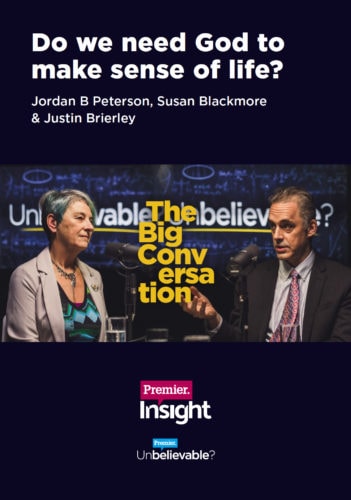
Should skeptics revisit the Bible? Jordan Peterson and these ex-atheists say “yes”.
Posted:Jana Harmon, whose PhD research is in adult conversion, considers Jordan Peterson’s recent claims about the Bible in the light of the experiences of former atheists.
In his January 2022 interview with Joe Rogan, Jordan Peterson described the bible as the precondition for truth itself:
“It isn’t that the bible is true. It’s that the bible is the precondition for the manifestation of truth, which makes it way more true than just true. It’s a whole different kind of true. And I think it is not only literally the case, factually. I think it can’t be any other way.”
This view of the bible, particularly from someone who doesn’t claim belief as a follower of Judaism or Christianity, is quite powerful or possibly even disturbing. How is it, in today’s Western post-Christian culture, that this ancient text can garner such a surprisingly elevated position by a prominent public intellectual? Is the bible worth a second look?
Former atheists’ views
Considering the bible in any serious form or positive fashion was simply out of the question according to many former atheists. In my doctoral research, they expressed many reasons to reject the text. It was viewed as ‘a mixture of myth, fabrication, ignorant commentary from Bronze Age Jews,’ ‘a tool that somebody had actually crafted to control the population,’ or generally a non-historical, false religious book’. Its supernatural content alone caused nearly half to soundly dismiss it.
For them, the bible wasn’t worth taking a first, much less a second look, unless to disprove or discredit it. Several reported the desire to investigate the bible’s credibility to ‘set a Christian straight.’
Ed recalled, “I remember specifically I needed to read about Jesus, so I could tell people that Jesus was baloney. So, I couldn’t just say, ‘I hated Christianity.’ I needed to be able to say, ‘I read it myself’.’’
Sean was challenged by a Christian to first read the bible before dismissing it. He recalled his response to the challenge, stating, “I went home, and I thought, ‘I am going to get this guy.’ I had this Bible lying around that someone bought me years ago.”
For Kyle, “One of the odd reasons why I ended up reading so much is because I wanted to make sure that it wasn’t true because I had heard people say, ‘Well, actually that there is a good amount of historical evidence for this’.”
Interestingly, some who began their quest towards discrediting scripture found themselves in a precarious place of changing their preconceived notions. Once they got round to examining the Bible, many found it to be historically, intellectually, and morally forceful, with ‘a ring of truth.’
William’s impressions and attitudes towards the bible changed as he read it, stating: “Over time, I found that as I was reading through Acts and as I moved on to the letters of Paul, I was learning so much. I could see that Christianity is really nice and good in its purest form. There were still things I didn’t believe and I found hard to accept, but the message itself as I came to understand it was just not something that I could hate anymore.”
Encountering the Bible for the first time, Anthony reported, “I started to read scripture. Originally, I thought if I have objections to this, I should at least read it and started to and found the reports in the New Testament to be fairly honest reports. Reading them without any scholarly training, reading it plainly the bible had the ‘ring of truth’ to it. It didn’t seem like people were telling things in a way that suggested that they were lying or had ulterior motives. They seemed honest and sincere, and the text had a groundedness to them.”
Nicholas was surprised by the distinctly historical nature to the Bible, that it was not worth taking seriously as he once thought. He recalls, “I actually started reading the Bible for the first time, critically rather than just, ‘Oh, this is silly.’ I started looking at the Bible as an actual historical document from the people who were there. That’s when it hit me. This is starting to get serious now because it is more than just someone claimed of being raised from the dead. It is something that happened in history.’ From there, I started putting everything together.”
Fascination
Although initially hostile to reading the bible, some were compelled towards serious, even voracious reading, surprised by what they found. Tom found a surprising insatiable appetite towards reading.
He states, “The first week he gave me an assignment to read the first three chapters of John. I had never read the Bible and did not even want to touch it. But I had to do the assignment, so I started reading. I could not stop and read the whole book of John that week. I loved the whole thing, but if there is no God, it’s just a story and I’m not going to put my trust in a story, but I kept reading.”
Reading the bible for the first time, Anthony couldn’t stop, recalling, “I was fascinated by it. I couldn’t read it enough. I read the New Testament in I think two weeks. I was on a holiday with my family and I spent the whole time on the beach reading Scripture. I read through a lot of the Old Testament books as well. I was literally hungry for it, utterly fascinated, I guess. I was intrigued by their lives. Certain of my objections seemed like they weren’t as severe as I thought they were and the actual content of Christianity, once I looked into it, when I read the Bible, it seemed compelling.”
Personal study diffused negative stereotypes of the bible, creating an unexpected openness and desire to read more.
Greg recalled his attitude shift: “I thought I knew the Gospels – those included miracles and healings which aren’t real. So, I started reading in Acts and I read, and I read and read was completely amazed. It caused me to think, ‘no one told me about this. I have never heard about these kinds of testimonies – the sermons they preached, the journeys that they made spreading the gospel.’ I couldn’t understand why they went to all the trouble to do that, to all die for it and commit their entire lives to it, especially the apostle Paul.”
He continued, “Paul was the most interesting character for me because he was a non-believer. I didn’t think that would be possible from the Bible. I didn’t think you would encounter intelligent characters like Paul. You wouldn’t encounter people with this kind of moral character, intellectual rigor. So, I had to read his words. I devoured them. I had to read them. I read Romans and then I went on to read the rest of the New Testament and then I went back to read the gospels. It was just amazing. That was, for me I think that was one of the hugest things was just reading the Bible was one of the biggest things for me becoming a Christian…I probably read the whole thing in three or four months.”
Jesus
Through reading the bible, others found the person of Jesus compelling – different from their ideas about who they thought he was.
Surprised by what he found in the bible, former atheist Greg expressed his initial impressions: “Jesus never flinched from asserting his authority as the Son of God. The titles he gave himself, the things he said to the religious elite, he didn’t back down from his claims. He claimed to be the Son of God. According to the eyewitnesses, he seemed to have worked miracles. And it was this combination of his compassion for the weak and his bravery, his courage in the face of evil. He did not back down from the Pharisees, from Pilate. He spoke the truth in a way you don’t see people normally do.”
“Nobody talks like Jesus does. He was so compelling. I just found him amazing. I never, never experienced that or heard of it that I could recall when I went to church. Either it wasn’t being preached or I was willfully ignorant of it, but it was all brand-new and I was amazed by it, by his preaching, by his parables, by his sermons. And it was profoundly convicting on the one hand, but it made me want to understand who he was, and can he be trusted, is this real? Those were the huge questions to me.”
One former atheist described reading about Jesus as a spiritual experience.
Christopher explained, “I was really feeling strongly drawn to the character of Jesus. It was hard to explain the discord in my mind and heart. I was thinking that Christianity is probably true being strongly, supernaturally, powerfully attracted to the person of Jesus, but somehow still hating Christianity. And the spiritual experience is when I would read or think anything about Jesus. I remember reading the Bible and literally shaking when I read the gospels because I just could not that there is a person like this, that this person was God, and that this person cared for me. Even though I wasn’t necessarily willing to jump in full boar at that point, that was like a draw on my heart that I felt needed an answer.”
After giving the Bible a second look, others were moved towards ‘testing out’ Christianity or even towards conversion.
After a period of extensive reading, Jeremy found Christianity worth practical exploration. He recalled, “At that point, I was reading an awful lot of the Bible and had shifted very much into well, ‘I want to take this for a test drive’ in a sense. I describe this experience as trying on other worldviews, sorting through a box of wires. And when I finally got down to what the meat of Christianity was, it with the only thing that kind of shocked back, kind of grabbing a live wire. And what that looked like for me is kind of hard to put into words.”
Matthew said, “I kept reading the bible. I kept wanting to give the New Testament a shot even though I had trouble understanding it. At this point I was more open than at any point. It was reading I John where he said ‘If you love the world, you can’t say that you love God. Everything in the world is passing away, the lust of the eyes, the lust of the flesh, the pride of life, but the one who does the will of God lives forever.’ This was what I had been thinking about all the time – there is no meaning to life, and it is all transitory and passes away and everything, and then I read this. So, I repented and got on my knees and prayed, and I was different. I was changed. I believe that is when I was born again.”
So, is the bible worth taking a second look? Many former atheists would answer a resounding ‘yes.’ They would agree with Jordan Peterson’s understanding of this ancient text as being profoundly true. But the question at hand is, do you? Are you willing to take a closer look?
Jana Harmon hosts the Side B Stories podcast where former atheists talk about their turn from disbelief to belief in God and Christianity. She is a Teaching Fellow for the C.S. Lewis Institute of Atlanta and former adjunct professor in Cultural Apologetics at Biola University where she received an M.A. in Christian Apologetics. Jana also holds a Ph.D. in Religion and Theology from the University of Birmingham in England. Her research focused on religious conversion of atheists to Christianity.
Want to learn more? Download your free, exclusive ebook: “Do we need God to make sense of Life” (featuring Jordan Peterson)
